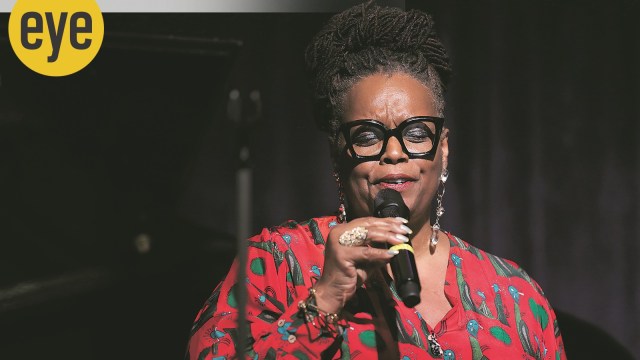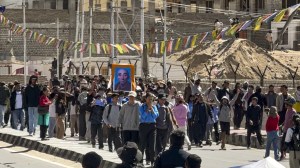Ella Fitzgerald could take any song and give it a jazz sensibility: Dianne Reeves
The Jazz vocalist and five-time Grammy winner on her first visit to India, the audacious women in jazz and the day she stood in for jazz queen, Ella Fitzgerald
 Dianne Reeves performing at Global Music Institute in Greater Noida
Dianne Reeves performing at Global Music Institute in Greater NoidaIt isn’t often that a vocalist can loom over her song’s story and its contextual edges with a vocal prowess that overpowers all that is said lyrically. Preeminent jazz vocalist Dianne Reeves, our connection to the world of jazz czarinas — Ella Fitzgerald and Sarah Vaughan — does that at 67 with a brazenness that’s intriguing and endearing in the same breath. Even though Reeves has always believed that voice is just an instrument and that it matters if one has a story to tell, her vocal agility and its dazzle continued to indulge one’s heart.
On her first trip to India with jazz legend Herbie Hancock, put together by the US Embassy, one saw that astute command, first at the Capital’s Piano Man Jazz Club during a celebration of Martin Luther King Jr Day (January 15) and later at Global Music Institute in Greater Noida, where she took over the reins, turning lyrics into a hippety-hop of sorts and springing to where the music takes her.
When students at Global Music Institute performed Waiting in vain — her stand-out cover of the Bob Marley song from her Grammy-winning album, Beautiful Life (2014) — Reeves got on stage with them, giving those present a peep into a scat singing extravaganza. “The stage is such a sacred space, and when you get together with different people, you find another part of yourself. So, anytime I collaborate with other people, I find something else. I love this music because it demands that you keep moving forward,” says Reeves, in an exclusive interview with The Indian Express.
Draped in a lavender pashmina, Reeves talks the way she sings, punctuating her words with smiles, earnestness and stories that traverse genres. “I grew up in a time when music was in alphabetical order, with no categories. You’d just go in there, something looks good, you get it, read the back of the album, get into that space and learn more, not only about the artistes but about yourself, because it’s so broad. It was extraordinary,” says Reeves.
Reeves was born in Detroit, USA, but raised in Denver and grew up with generations of musicians and music around her — with parents, grandmothers, aunts, uncles (including legendary bass player Charles Burrell), tinkering with a piano at home and, of course, soaking in the vibrant music scene in Detroit and Denver. “They were coming out of vaudeville and they knew all this early music of great people like Ma Rainey and Bessie Smith. Then my sister, who was 10 years older than me, was listening to the more contemporary, really cool stuff,” says Reeves, who began singing at an early age.
She was 16 when jazz icon Ella Fitzgerald, a household name even then, visited a local club named Warehouse in Denver. “The first night I went to see her, she was singing songs of The Beatles. But she was swinging it so hard, I didn’t even know that was a possibility. She could take any song and give it a jazz sensibility and, well, she wore those songs out,” says Reeves, with a laugh.
Fitzgerald was slated to do more shows but the altitude of the city got to her and Reeves was asked to take her place one evening. A nervous Reeves walked into the dressing room that was full of Fitzgerald’s gowns and jewellery. A pair of blue-periwinkle leather pumps caught her eye, which Reeves finally wore to the gig that night. “The whole time, while I sang, I looked down at the shoes, because it just didn’t feel like I should be there,” says Reeves.
Years later, when Reeves moved to LA and had a small band of her own, Betty Carter happened. One day, she was asked to hurry to a club where the jazz singer was performing. “When you see somebody on stage and they are doing things that allow you to recognise something on a cellular level, for me, it was a religious experience. I remember being in this place where I couldn’t even function or go home,” says Reeves.
Since she couldn’t go home, Reeves went to Tower Records, the popular music retail store then, and bought all of Carter’s records and a turntable to play them on. She placed flowers on the side of the table, crossed her legs, sat on the floor and played Carter. Over and over. “She stood in the band and was a co-creator in the band. I had never heard anybody phrase and use time in that way. They would do the same songs every single night, it would just be different the way that she would do it. So yeah, Betty Carter was very very important to my life. Very few people, except Oscar Peterson, could stand toe to toe with her,” says Reeves, who imbibed not only music from women in jazz, a rare breed in the male-dominated artform, but also a way of life. “The joy, the courage the audacity, to define and refine, and respect and protect what you have , this idea of femininity she presented — ‘you may not honour my femininity but it is what I lead with and it is my power’ — was brilliant,” adds Reeves, who then moved to New York and toured as a lead vocalist with Harry Belafonte.
While this is her first trip to India, her first brush with Indian music remains sitar legend Pt Ravi Shankar, whom she heard through her sister’s music collection. Which is probably why her respect for Indian classical music is unwavering. Back then the similarities between jazz and Indian classical music — both being oral, living traditions and consider improvisation as the cornerstone — weren’t lost on her. “I had never heard anything like that (Shankar) before. But it opened my mind and it opened my heart and I knew the possibilities were endless,” says Reeves.





- 01
- 02
- 03
- 04
- 05


























